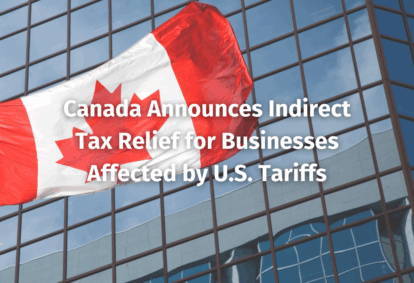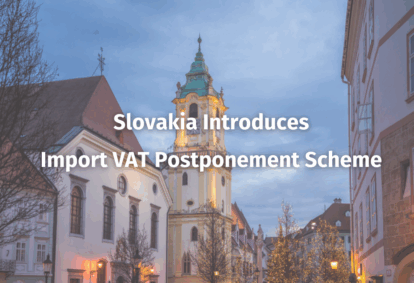Global VAT Guide: May 2025
The May edition of the Global VAT Guide features comprehensive updates on VAT regulations and developments from Belgium, Bulgaria, Estonia, Germany, Greece, Norway, Sweden, Kazakhstan, Namibia, South Korea, Taiwan and Ukraine.
Belgium
Ministry of Finance launched the MyMinfin and Intervat APIs
In February 2025, the Belgian Federal Public Service Finance officially launched two new APIs (Application Programming Interfaces) as part of its ongoing commitment to digitalising the relationship between taxpayers and tax authorities.
These updates are in line with the Law of 26 January 2021 (Loi du 26 janvier 2021), which aims to streamline and digitise interactions between administrative authorities and taxpayers.
The Two New APIs Are:
- MyMinfin API
- This API allows taxpayers to seamlessly download and view documents from MyMinfin within external software systems, thus enhancing efficiency and reducing the system load.
- Intervat API:
- This API enables users to submit periodic VAT Returns directly through their accounting software, further automating and simplifying the VAT filing process.
The introduction of these APIs is part of a broader initiative under the 2021 Law to dematerialise the relationship between tax authorities and taxpayers, including private persons, legal entities, and third parties.
This initiative seeks to improve accessibility, transparency, and efficiency in tax-related processes.
While machine-to-machine transmission of VAT reporting forms was initially announced in the last quarter of 2023, its large-scale implementation was delayed until the necessary technical aspects were fully addressed.
Monthly refund request
Requesting a VAT refund is now done exclusively through the checkbox in the VAT return, without needing special authorisation. Requesting VAT refunds can also be done through the new VAT provision account. This simplification applies to all periodic returns filed from 1 January 2025.
As confirmed by the Federal Public Service Finance on 18 February 2025, taxpayers can continue to request the full refund of available VAT credits for all periodic returns filed before 1 October 2025 by checking the “Request for Refund” box in their VAT return.
From 1 October 2025, after the transitional period ends, VAT refunds through the VAT return will be subject to the following conditions:
- The refund amount must be at least €50.
- The refund request must be within the VAT credit available for the current reporting period, as indicated in Box 72 of the VAT return.
- Carry-forward amounts from previous periods cannot be refunded in the current return and must be transferred to the Provisional Account (Compte-Provisions). Refunds for these amounts can be requested via a dedicated MinFin request.
- The VAT refund for the current period must be submitted on time.
- All VAT returns for the past six months must be filed on time.
- A valid bank account number must be provided to the authorities.
If any of these conditions are not met, the VAT credit will be transferred to the Provisional Account and can only be refunded via a dedicated MinFin request procedure.
VAT credits recorded in the Current Account (Compte Courant) and not requested by 30 September 2025 will be automatically transferred to the Provisional Account.
From 1 October 2025, the Current Account will become permanently inaccessible.
These changes ensure a smoother, more streamlined VAT refund process while offering clarity on conditions for eligibility and deadlines.
Bulgaria
VAT registration threshold
On 27 March 2025, the Budget Law 2025 was published in National Gazette 25, which outlines several key amendments to the VAT system in Bulgaria.
The VAT registration threshold has been lowered to BGN 100,000 (approximately €50,000).
This applies to businesses established in Bulgaria, meaning they must register for VAT if their turnover exceeds BGN 100,000 in the last 12 consecutive months before 1 April 2025.
Earlier in December 2023, an amendment to the VAT Law temporarily raised the VAT registration threshold to BGN 166,000 (around €85,000) for the period between 1 January 2025 and 31 March 2025.
However, the final Budget Law 2025 has reverted this change back to the threshold of BGN 100,000 (€50,000) for the remainder of 2025.
Businesses that exceed the BGN 100,000 turnover threshold in the 12 months before 1 April 2025 must now register for VAT.
This change aligns with the threshold applicable for 2024, as the temporary increase (to BGN 166,000) is no longer in effect after 31 March 2025.
Estonia
eInvoice reporting – B2B buyers
On 18 September 2024, the Estonian Parliament passed the Bill on Amendments to the Accounting Act (428 SE), aligning with the EU electronic invoice (eInvoice) directive to modernise and streamline invoicing processes.
The amendment introduces new provisions to encourage e-Invoicing adoption in the private sector.
Some key provisions of the Amendment include:
- B2B Buyers’ Rights:
- Buyers who are registered as eInvoice recipients in the official register will be able to request their suppliers to issue eInvoices.
- Once the supplier agrees, they must inform the Estonian Commercial Register that they are issuing eInvoices to their buyer or acting as an eInvoice handler.
- Standard for eInvoicing:
- The default accepted standard for eInvoicing will be EN 16931, in line with EU Directive 2014/55/EU on eInvoicing. However, parties may agree to use another relevant standard.
This voluntary obligation for eInvoicing will be in effect from 1 July 2025.
The goal is to encourage private sector adoption of the eInvoicing system, thereby promoting a unified European standard for digital invoicing.
All Estonian public entities have been required to issue eInvoices since 2019. This new amendment seeks to extend the practice to the private sector and streamline invoicing across both sectors.
In a 4 December 2024 announcement, the Ministry of Finance revealed further plans to enhance VAT collection in Estonia.
These plans include a draft amendment to the VAT Act that will mandate e-Invoicing for all VAT-subjected B2B transactions starting in 2027.
Germany
Changes in Foreign VAT refund procedure for non-EU claimants
On 27 March 2025, the Federal Ministry of Finance (Bundesministerium der Finanzen, BMF) published a BMF letter introducing changes to the Foreign VAT Refund procedure for non-EU claimants.
The updates aim to clarify the acceptance of electronically transmitted invoices and electronically issued Certificates, improving administrative efficiency and digital compatibility.
Electronically Transmitted Invoices (eInvoices), these may now be submitted in the following formats:
- Via storage medium (e.g., USB stick)
- Uploaded to the BOP Portal (either together with or separately from the Application Form)
All invoices must be submitted before the application deadline.
Late submissions will not be accepted.
Electronically Issued Certificate are acceptable provided they match the content of the official Form USt 1 TN Model, used as proof of VAT registration for entrepreneurs.
The provisions outlined in the letter are applicable to all open cases, offering immediate effect to ongoing refund procedures.
Germany
Intrastat Thresholds
Following amendments to the Foreign Trade Statistics Law on 5 March 2025 and its implementing regulation on 6 March 2025, Germany has raised its Intrastat thresholds for intra-EU trade reporting.
The updates apply retroactively from 1 January 2025 and are aimed at reducing administrative burdens for businesses.
New Intrastat Thresholds (Effective 1 January 2025):
- Exports (Dispatches):
- Threshold raised from €500,000 to €1,000,000
- Imports (Arrivals):
- Threshold raised from €800,000 to €3,000,000
Businesses that already submitted Intrastat declarations under the old thresholds for 2025 do not need to take any corrective action.
These changes are expected to exempt many small and medium-sized enterprises from monthly Intrastat reporting obligations.
Greece
Introducing monthly VAT reporting for new small establishments
On 31 March 2025, the Greek Independent Authority for Public Revenue (AADE) issued an announcement following circular A. 1049/28-03-2025, introducing new VAT reporting obligations for businesses that operate under a simple accounting system.
This regulation is aimed at tackling tax evasion, particularly among businesses that close shortly after starting without fulfilling their tax obligations.
Newly established businesses starting on or after 1 April 2025 will be required to submit monthly VAT returns for the first 24 months of operation, regardless of their accounting system.
Businesses started between 1 January 2024 and 31 March 2025 that are using the simple accounting system will also be required to submit monthly VAT returns starting from the July 2025 reporting period.
Businesses started before 31 December 2023 can voluntarily opt to report VAT monthly starting from the October 2025 reporting period onwards.
The simple accounting system applies to businesses whose 12-month turnover does not exceed €1,500,000. If a business exceeds this threshold, it must transition to a double-entry accounting system.
After the initial 24 months of monthly VAT reporting (or 12 months for those voluntarily opting for monthly reporting), businesses can switch to quarterly VAT submissions.
Any change in reporting frequency (from monthly to quarterly or vice versa) can only be made after a period of 12 months from the previous change.
The aim of these regulations is to reduce tax evasion, particularly by newly established businesses that shut down shortly after formation, leaving their tax obligations unmet.
Norway
Proposal consultation VAT on cross-border trade in services
On 21 March 2025, the Norwegian Ministry of Finance proposed significant changes to the VAT rules to address loopholes used by international companies, particularly financial institutions, to avoid VAT on services used in Norway.
VAT would apply based on where the service is used, rather than the location of the contracting party.
This is intended to close existing gaps where international companies avoid VAT on services provided to Norwegian businesses or consumers.
The changes aim to target loopholes often exploited by international financial institutions, ensuring that services used within Norway are subject to appropriate VAT rates.
The proposal aligns with the OECD recommendations, which aim to enhance neutrality and competition in international trade and services. It is part of ongoing efforts to improve the fairness and transparency of VAT systems globally.
The proposal includes provisions for an expanded input VAT deduction for services used outside of Norway.
This is designed to make the VAT system more flexible and ensure that businesses can claim deductions for services they use in their operations, regardless of where they are provided.
The consultation deadline for stakeholders to provide feedback on the proposal is 21 June 2025.
Sweden
Non-EU VAT groups
On 16 April 2025, the Swedish Tax Agency (Skatteverket) published an updated version of its Guide for Non-EU Taxable Persons, providing important clarification regarding VAT refund applications by non-EU VAT Groups.
The update confirms that a non-EU VAT Group should not be treated as a single taxable person for the purpose of VAT refunds.
Instead, each company within the group is considered a separate taxable person, and each must submit its own VAT refund application.
Group-level applications will not be accepted.
This clarification aims to ensure compliance with Swedish VAT rules and to streamline the refund process for non-EU entities operating in group structures.
Kazakhstan
Changes in Tax code
The Kazakhstan Government is progressing with proposed amendments to the Tax Code, with several VAT-related changes approved during the first reading of the draft legislation.
Some of the key measures include:
- An increase in the standard VAT rate from 12% to 16%
- Introduction of a 10% reduced VAT rate on paid medical services
- Extension of VAT to include banking transactions
- Exemptions from VAT for food products, book printing, archaeology, and certain medicines
- A lower VAT registration threshold, reduced from 80 million tenge to 40 million tenge (originally proposed at 15 million tenge)
These changes reflect the Government’s broader tax policy reform aimed at expanding the VAT base and increasing revenue efficiency. Parliamentary discussions will continue until the second reading, during which amendments may still be introduced.
Namibia
VAT on imported digital services by non-resident suppliers
On 31 March 2025, the Namibian Ministry of Finance released its Medium-Term Expenditure Framework (MTEF) for the years 2025–2026 to 2027–2028, outlining key fiscal measures for the coming years.
One of the most significant changes proposed is the introduction of VAT on digital services provided by non-resident suppliers.
This will affect foreign companies offering services such as streaming, cloud storage, and other online platforms to Namibian users.
Foreign service providers that supply digital services to Namibian consumers will soon be required to charge VAT, similar to how local businesses are taxed.
The primary goal is to eliminate the current tax advantage enjoyed by non-resident providers, who do not currently charge VAT, giving them an unfair edge over local businesses.
The Ministry of Finance has not yet announced an official start date for the new rule but has stated that further details will be shared soon, including the operational framework and the implementation timeline.
South Korea
VAT Support measures for businesses affected by wildfires
On 3 April 2025, the South Korean National Tax Service (NTS) published a press release announcing tax relief measures to support businesses in regions affected by recent wildfire-related disasters.
Businesses in the affected regions can avail of a two-month extension for their VAT payment deadlines.
An additional extension of up to nine months may be granted upon request, providing businesses more time to meet their tax obligations.
The aim of these measures is to offer financial relief to businesses impacted by the wildfires, allowing them to recover and continue operations without the added pressure of imminent tax deadlines.
Taiwan
Threshold for registering non-resident e-commerce operators
On 7 April 2025, Taiwan’s Ministry of Finance announced an increase in the annual sales threshold for foreign e-commerce operators required to register for VAT.
The threshold has been raised from NT$480,000 (approximately €13,970) to NT$600,000 (approximately €16,800).
The new threshold aligns the VAT registration requirement for foreign e-commerce operators with that of small-scale domestic service providers.
Foreign enterprises selling electronic services, such as digital goods or services, to individuals in Taiwan via the internet or other digital means must register if their annual sales exceed NT$600,000.
Businesses that exceed this threshold must register through Taiwan’s Overseas E-Commerce Taxation Zone and comply with local invoicing and tax declaration requirements.
This adjustment is aimed at simplifying the VAT compliance process for small-scale foreign operators, while ensuring that larger foreign businesses contribute fairly to Taiwan’s tax system.
Ukraine
Government approval of a draft law on OECD-Model reporting on income received through digital platforms
In March 2025, the Ukrainian Ministry of Finance published a draft law aimed at implementing the international automatic exchange of information on income earned through digital platforms.
On 29 April 2025, the Ukrainian government officially confirmed the approval of the draft law.
The law seeks to harmonize Ukraine’s tax legislation with European Union standards and OECD guidelines on digital platform reporting.
The law applies to digital platforms (such as websites and applications) that facilitate the sale of goods, provision of services, or property rentals.
Platform operators, both local and foreign, must register if they qualify as reportable platform operators.
They must submit annual reports by 31 January of the following year, detailing the activities and income of sellers using the platform.
The law will apply to reporting periods starting on 1 January 2026.
The first reporting deadline for the income of accountable sellers will be set by the central executive body responsible for financial policy.
This will occur no earlier than 31 January 2027.
The draft law aims to create greater tax transparency for income earned through digital platforms and align Ukraine’s tax practices with international standards. This would also ensure fairer taxation for sellers operating through digital platforms, both in Ukraine and internationally.
Stay Up to Date with Our VAT Newsletter
To ensure you remain informed about the latest VAT news, trends, and topics from around the globe, subscribe to our VAT Newsletter. Each month, we deliver insightful updates straight to your inbox, helping you stay ahead of the curve.
Partner with Real VAT Experts
With decades of experience in VAT compliance and consultancy, our team at Taxback International stands ready to assist you. We offer comprehensive expertise across all countries and languages where VAT obligations exist.
Explore Cutting-Edge Solutions
In addition to our consultancy services, we’ve developed tailored technology solutions to address the VAT challenges confronting businesses today.
Here’s a glimpse of what we offer:
Comply: Our VAT Compliance platform ensures seamless adherence to VAT regulations.
VATConnect: Optimise VAT reclaim processes, both foreign and domestic, with our VAT Reclaim platform.
TBI Pay: Simplify cross-border payments using our streamlined technology solution.
Reach out to us today



